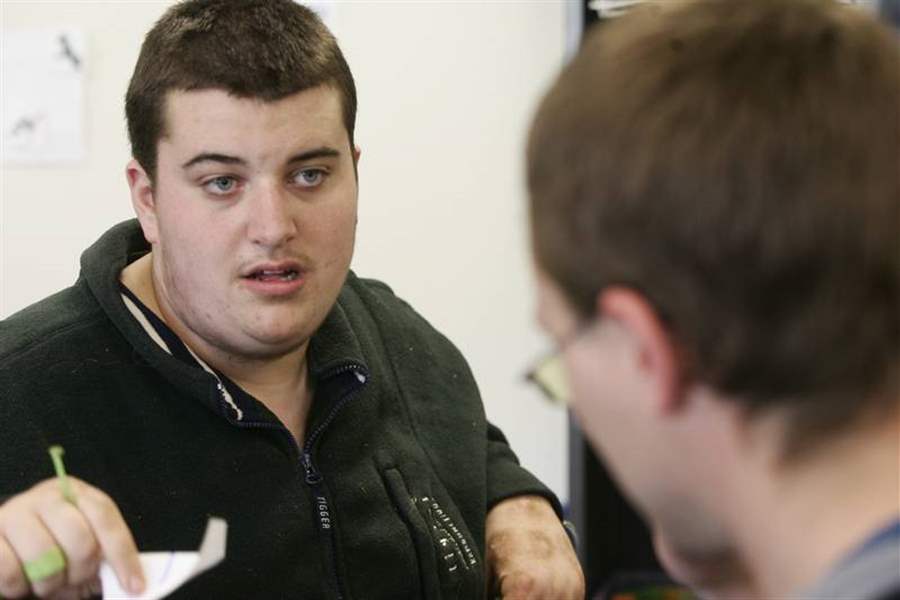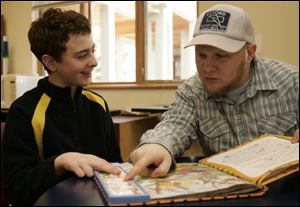
Conference to focus on autism
9/12/2006
Jeff Wilson, who is autistic, interacts here with Allen Rawlins at Bittersweet Farms. Autism is the fastest growing disability in the nation.

Reed Mayberry, left, who is part of an autism program at Bittersweet Farms, works with Scott Biddle.
Phil Morgan sits on one end of a couch, then the other, before settling in the middle.
The 48-year-old enters most buildings through the back entrance. When he leaves, he walks up and down a driveway twice before continuing on to his next destination.
Mr. Morgan is one of more than a million people nationwide with autism, and routines like those govern his life.
"It's the structure he imposes on his life to give himself order," explains Chuck Saunders, outreach director at Bittersweet Farms, an 80-acre working farm in Whitehouse that provides professional and support services to autistic adults.
Resistance to change is one of the staple characteristics of autism, Mr. Saunders said, which explains why those with the disorder rely so heavily on rituals.
"If certain parts of his [Mr. Morgan] world aren't the way they're supposed to be, he gets upset," he said.

Jeff Wilson, who is autistic, interacts here with Allen Rawlins at Bittersweet Farms. Autism is the fastest growing disability in the nation.
Autism is a neurological disorder that primarily affects a person's ability to communicate and interact socially, and often appears during the first three years of life. It is the fastest growing disability in the United States, and is increasing at a startling rate of 10 to 17 percent each year, according to the Autism Society of America.
Because many conferences held on autism focus on children with the disorder, the University of Toledo's University Medical Center and Bittersweet Farms are sponsoring northwest Ohio's first conference addressing some of the issues relating to adults with autism.
The conference, scheduled for Thursday and Friday, will focus on some of the long-term care needs required for adults with autism and will also highlight programs that are beneficial for autistic individuals as they get older.
David Holmes, the founder of the Eden Institute in Princeton, N.J. - a nonprofit organization designed to provide autistic adults with the skills needed to live independently - is one of the scheduled feature speakers at the conference. Another is Max Wiznitzer, director of Rainbow Babies and Children's Hospital Autism Center in Cleveland.
Many people with autism require lifelong support, which can emotionally and financially drain the families of those with the disorder.
Treatment, diagnoses, and intervention of autism costs an estimated $90 billion each year, and 90 percent of that is spent on adult services, autism experts say.
Families often bear the brunt of those costs because many Ohio insurance providers don't offer coverage for treatment and intervention services, says Barb Yavorcik, president of the Autism Society of Ohio.
"Some people mortgage their homes to be able to afford therapy for their kids," she says.
Ohio and Michigan do not keep statistical information on the number of people with autism. Based on the prevalence of the disorder and the state's 2005 population, Ms. Yavorcik estimates that more than 50,000 Ohio children and adults have autism.
The Michigan Department of Education reports that more than 10,000 children in Michigan schools are autistic.
Parents of autistic children can be faced with the challenge of deciding where their child will live as they enter adulthood. Some live at facilities like Bittersweet Farms that provide around-the-clock support, while others move to supported living communities.
Families who can't afford to send their children to these types of facilities usually continue to care for them at home. Ms. Yavorcik says this sometimes creates added concerns for parents such as, "Who's going to watch out for them when we die?"
Although it is possible for an autistic individual to live on his own, not many do because they are so vulnerable, Ms. Yavorcik says. "They would be more likely to be conned or scanned because of the inability to pick up on social cues and facial expressions," she says.
People with autism also have difficulty understanding social behaviors such as how to introduce themselves, where it is appropriate to stand when speaking with someone, or how loud to talk - and that makes getting and keeping a job challenging.
"We may have some individuals who are extraordinarily capable, but can't get past the interview because they have difficulty with social response," says Jan Cline, clinical services director at Bittersweet. "They may get a job and have difficulty maintaining it because of some of the social deficits."
Those with autism are often classified as "low-functioning" or "high-functioning" based on their abilities and the level of support they need, experts say.
As he does many days, Mr. Morgan - who is considered low-functioning - walks up and down the driveway twice, enters the kitchen through the back door, and then picks up a broom to begin sweeping.
A tall, thin man with a face devoid of much emotion, Mr. Morgan stands in one spot for several minutes brushing dirt into a pile, Mr. Saunders prompts: "What's the next thing you need to do?"
Almost immediately, Mr. Morgan pushes the dirt into a dust pan, and starts sweeping a new section of the floor.
Bittersweet Farms, other community and supported-living facilities, and the families of people with autism serve an important role, Mr. Saunders said.
"Just like a person without a leg needs a prosthetic leg, or just like somebody who has poor vision needs eyeglasses - we are the prosthetic for people with autism," he said.